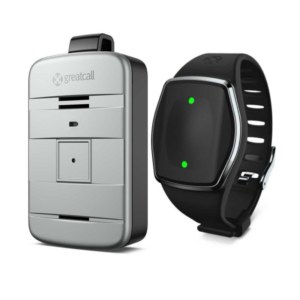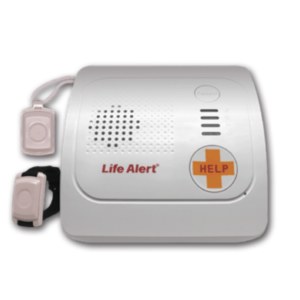GreatCall Vs. Life Alert
AgingInPlace.org keeps our resources free by working as an affiliate partner with some companies mentioned on our site. These partnerships or the commission we may earn do not affect our opinions or evaluations of the products we mention. Our reviews are solely based on our research methodology and from input from our AgingInPlace.org Advisory Board. Learn more about our ad policies.
GreatCall Vs. Life Alert
Products carousel
Byline: Jennifer Walker-Journey
Medical alert systems serve a vital purpose in helping seniors live independently for longer. They can provide timely intervention in the event of a medical emergency. Also, according to Dr. Rizza Joyce Mira, a medical doctor and writer, “Non-medical crises, such as house fires or break-ins, can also benefit from medical alert systems.” This provides even greater peace of mind for the care recipient and the caregiver.
Both brands offer 24/7 monitoring services for medical and non-medical emergencies, but beyond that, the two brands are quite different.
There are literally dozens of personal emergency response systems on the market. Deciding on one can be daunting. In an effort to help limit the choices caregivers face, the experts at Aging In Place compared two top medical alert system brands currently on the market—Life Alert and GreatCall. Here’s what they found.
Key Takeaways
- GreatCall, which rebranded as Lively last year, sells a line of medical alert devices geared toward more active and tech-savvy seniors. But the company does not offer an at-home system.
- All three Life Alert systems include an at-home system.
- No Life Alert systems have fall detection; GreatCall’s mobile button and smartwatch devices have fall detection with the top-tiered Health & Safety Package.
Overview of GreatCall/Lively vs. Life Alert
Both Life Alert and GreatCall have been on the market for a while and offer a variety of medical alert systems and services.
GreatCall was started more than 15 years ago, launching into the market with the Jitterbug, an easy-to-use cellular phone for seniors who weren’t very tech-savvy. In 2018, GreatCall was purchased by Best Buy Co., and in June 2021, GreatCall was rebranded as Lively. Because many people are more familiar with the brand name GreatCall than with Lively, we will use the names interchangeably throughout this review.
Life Alert was founded 35 years ago and has become a reliable name in the medical alert industry with its U.S.-based, owned, and operated licensed monitoring center. Much of its household name recognition can be chalked up to the television commercials with the catchphrase, “Help! I’ve Fallen and I Can’t Get Up!” that ran throughout the 1980s and early 1990s. In the decades since, the company has remained on top of the market, adding new technology throughout the years, including a convenient waterproof help button (ideal for use in the shower or bathroom).
Both brands offer 24/7 monitoring services for medical and non-medical emergencies, but beyond that, the two brands are quite different.
GreatCall/Lively vs. Life Alert Comparison
| FEATURE | LIFE ALERT | GREAT CALL (LIVELY) |
| Call Center Hours | 24/7 | 24/7 |
| Contract | 3-year | Month-to-month |
| Cancellations | Contract can only be canceled if the user passes away or the family provides proof that the user requires 24-hour nursing care | Can cancel at any time. User may receive a prorated refund for any time left on their plan |
| Available Devices | At-home unit with pendant or wristband call button; waterproof wall button; GPS-enabled button | Smartphone; flip phone; belt clip or lanyard button; smartwatch; app that works with iPhones and Apple watches |
| Monthly Cost | $49.95-$89.95 | $14.99-$44.99 |
| Equipment Cost | $0 | $49.99-$149.99 |
| Activation Fee | $96-$198 | $35 |
| In-Home Unit Range | 800 feet | N/A |
| Battery Life | Up to 72-hours of backup battery in home base station; up to 5 days for GPS-enabled mobile units; up to 10 years in shower wall button | Up to 24 hours in rechargeable battery in Lively Mobile Plus; up to 4 months with Lively Wearable 2 |
| Automatic Fall Detection? | No | Included with Ultimate Health & Safety Plan |
| Connection Type | Cellular (AT&T network) and landline | Cellular (Verizon network) |
| Water-Resistant? | Yes | Yes |
| GPS Tracking Option | Included with HELP On-The Go + GPS device only | Included |
| Two-Way Voice Communication? | Yes | Yes |
| Mobile App? | Yes | Yes |
| Optional Monthly Add-Ons | Additional medical alert buttons | Protection plan: $5/month; Caregiver tracking app up to $5 |
| Special Features | – Long-lasting batteries of up to 10 years. – 3-year contract guarantees price for the duration of the contract | – Urgent Care feature that enables seniors to be connected to a doctor or nurse any time of the day or night; -app that works with iPhones and Apple watches; – Lively Rides care service provides discounts through national ridesharing company Lyft |
| FEATURE | LIFE ALERT | GREAT CALL (LIVELY) |
| Call Center Hours | 24/7 | 24/7 |
| Contract | 3-year | Month-to-month |
| Cancellations | Contract can only be canceled if the user passes away or the family provides proof that the user requires 24-hour nursing care | Can cancel at any time. User may receive a prorated refund for any time left on their plan |
| Available Devices | At-home unit with pendant or wristband call button; waterproof wall button; GPS-enabled button | Smartphone; flip phone; belt clip or lanyard button; smartwatch; app that works with iPhones and Apple watches |
| Monthly Cost | $49.95-$89.95 | $14.99-$44.99 |
| Equipment Cost | $0 | $49.99-$149.99 |
| Activation Fee | $96-$198 | $35 |
| In-Home Unit Range | 800 feet | N/A |
| Battery Life | Up to 72-hours of backup battery in home base station; up to 5 days for GPS-enabled mobile units; up to 10 years in shower wall button | Up to 24 hours in rechargeable battery in Lively Mobile Plus; up to 4 months with Lively Wearable 2 |
| Automatic Fall Detection? | No | Included with Ultimate Health & Safety Plan |
| Connection Type | Cellular (AT&T network) and landline | Cellular (Verizon network) |
| Water-Resistant? | Yes | Yes |
| GPS Tracking Option | Included with HELP On-The Go + GPS device only | Included |
| Two-Way Voice Communication? | Yes | Yes |
| Mobile App? | Yes | Yes |
| Optional Monthly Add-Ons | Additional medical alert buttons | Protection plan: $5/month; Caregiver tracking app up to $5 |
| Special Features | – Long-lasting batteries of up to 10 years. – 3-year contract guarantees price for the duration of the contract | – Urgent Care feature that enables seniors to be connected to a doctor or nurse any time of the day or night; -app that works with iPhones and Apple watches; – Lively Rides care service provides discounts through national ridesharing company Lyft |
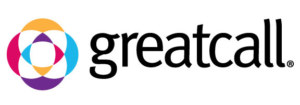
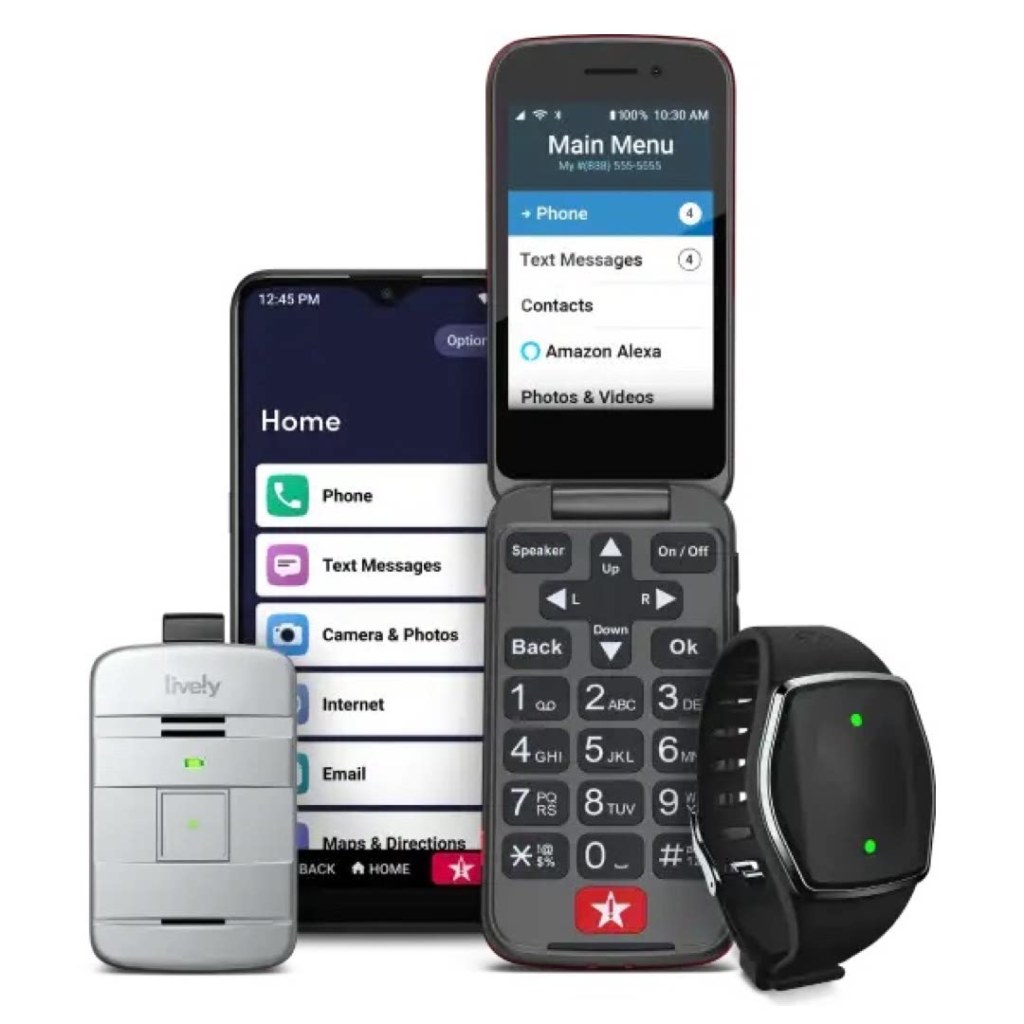
GreatCall puts a new twist on medical alert systems. The company aims to sell to a client base of more active or tech-savvy seniors with its easy-to-navigate smartphone that works off the Verizon network. The phone has a larger screen and simple list-based menu. It can be used for talking, texting, surfing the internet, checking email, taking photos, or playing games.
The company also has a more basic flip phone version for texting and talking, plus it offers an 8MP camera, Amazon Alexa, an urgent response button, brain games, a magnifier, and a flashlight. Those devices can be loaded with urgent response service (as well as other Lively medical alert services) by adding a Health & Safety Package for an additional $19.99, $24.99, or $34.99 (Basic, Preferred, or Ultimate plans, respectively) on top of the talk and text package already included with the phone.
GreatCall also has the Lively Mobile+ mobile medical alert button with enhanced GPS and two-way communication, or the sleek and discreet Lively Wearable2 button that can be worn around the neck or on a watch-style wristband (which looks more like a smartwatch than a medical alert button). It requires the Lively app and a smartphone. Both the Lively Mobile+ and the Lively Wearable2 require one of the tiered Health & Safety Packages. Fall detection is available on both with the top-tiered Ultimate Health & Safety Package. One great feature only available with the Preferred and Ultimate Health & Safety Packages is Urgent Care, a service that connects users to a doctor or nurse any time of the night or day.
We called the company to clarify pricing, which for the Flip2 and Smart3 phones differed from what the website stated. We also found that the sales rep seemed to be a little annoyed with us and were far too aggressive about wanting to close a deal, making getting off the phone difficult. On the plus side, Lively doesn’t require any long-term contracts, and when compared to Life Alert, its cancellations are much less difficult. However, we did find that some consumers complained that the devices seemed cheaply made and were prone to breaking. Another plus is that GreatCall offers AARP members a $60 per year discount on select devices and Health & Safety Packages, and up to a $200 discount on select Apple Watch and iPhone models at Best Buy.
Best for: More Active or Tech-Savvy Seniors
Pros
-
Variety of tech options, including easy-to-navigate smartphone, flip phone, mobile medical alert button, smartwatch and Lively medical alert app that works with Apple watch
-
Urgent Care feature allows users to talk with a doctor or nurse 24/7
-
Plan discounts for AARP members and discounts toward iPhone purchases
-
30-day money-back guarantee
Cons
-
No at-home monitoring system
-
Fall detection only available with more expensive plans
-
No at-home base station unit
| Great Call/Lively System | Device Type | Monthly Cost | Activation Fee | Equipment Fee |
| Jitterbug Smart3 | Smartphone | $24.99-$44.99 | $35 | $149.99 |
| Jitterbug Flip2 | Flip phone | $24.99-$44.99 | $35 | $99.99 |
| Lively Mobile+ | Belt clip or lanyard | $24.99-$39.99 | $35 | $49.99 |
| Lively Wearable2 | Watch | $24.99-$39.99 | $35 | $49.99 |
| Great Call/Lively System | Device Type | Monthly Cost | Activation Fee | Equipment Fee |
| Jitterbug Smart3 | Smartphone | $24.99-$44.99 | $35 | $149.99 |
| Jitterbug Flip2 | Flip phone | $24.99-$44.99 | $35 | $99.99 |
| Lively Mobile+ | Belt clip or lanyard | $24.99-$39.99 | $35 | $49.99 |
| Lively Wearable2 | Watch | $24.99-$39.99 | $35 | $49.99 |
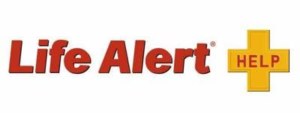
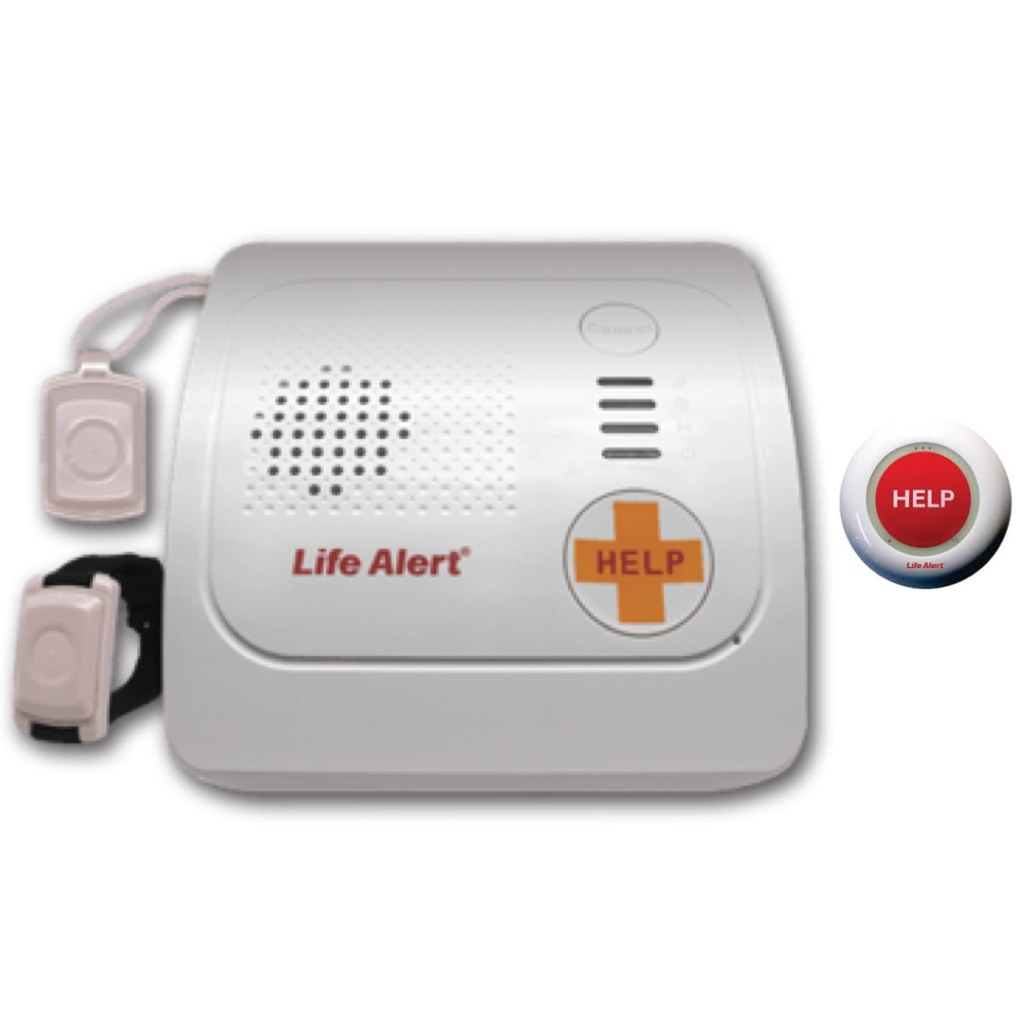
Life Alert Overview
Life Alert may have improved its technology during the past three and a half decades, but the design of its website remains somewhat outdated, with its plans being a bit hard to discern in particular. There are actually three plans to choose from, but getting pricing requires an actual phone call with a customer service rep, who will require you to listen to a sales pitch first. Unlike a lot of medical alert companies, Life Alert does not outsource its monitoring services. All calls come into its U.S.-based, owned, and operated monitoring center.
Life Alert’s flagship service is its at-home system, which comes with a help button that communicates with a base station. The base station and pendant system have a moderately high monthly cost compared to competitors. A waterproof shower button is available for an additional $20 per month. Life Alert also offers a mobile device for an additional $20 per month, but only as an add-on service to the at-home and help button units. Unfortunately, that makes its monthly cost higher than most competitors.
The biggest drawback of Life Alert is the three-year contract users are required to sign. The only way to break it is if your loved one passes away, gets moved to an assisted living facility, or requires 24-hour nursing care. On the flip side, Life Alert promises not to raise the price of monitoring during that three-year contract period. Plus, if your loved one passes away in the home—whether or not they tried to call for services—Life Alert will refund 100 percent of all services that were received, including the installation fee. However, according to several consumer reviews we found, getting those cancellations and refunds isn’t a walk in the park and may require numerous phone calls.
Best for: Less Active Seniors in Need of a More Home-Based Medical Alert Service
Pros
-
Price guarantee for entire length of contract
-
Twelfth month free for those who pay annually
-
Life Alert-owned and operated U.S.-based licensed call center
-
Waterproof wall button available for shower emergencies
Cons
-
Mobile plan only offered as an add-on for the at-home plan
-
Requires three-year contract, which can only be broken if user passes away or requires 24-hour nursing care
-
No fall detection
| Life Alert System | Monthly Cost | Activation Fee | Equipment Fee |
| In-Home System | $49.95 | $96 | $0 |
| In-Home System + Help Button | $69.95 | $96 | $0 |
| In-Home System + Help Button + GPS System | $89.95 | $198 | $0 |
| Life Alert System | Monthly Cost | Activation Fee | Equipment Fee |
| In-Home System | $49.95 | $96 | $0 |
| In-Home System + Help Button | $69.95 | $96 | $0 |
| In-Home System + Help Button + GPS System | $89.95 | $198 | $0 |
Similarities and Differences Between Life Alert and GreatCall
Let’s take a closer look at how Life Alert and GreatCall are similar, and how they differ.
Similarities
- 24/7 urgent response
- Water-resistant buttons
- GPS tracking available on mobile devices
- Two-way communication
- Mobile app
Differences
- Life Alert requires a three-year commitment, whereas GreatCall doesn’t require a long-term contract.
- Both companies offer mobile buttons, but only Life Alert offers an in-home system.
- GreatCall has more discreet options, such as a flip phone, smartphone, or smartwatch.
- GreatCall has an equipment fee on all its products, while Life Alert’s does not.
- GreatCall has a flat $35 activation fee, while Life Alert’s activation fees range from $96-$198, depending on the service plan.
- Life Alert’s monitoring fees run higher, on average, than GreatCall’s.
- Only GreatCall offers fall detection.
What Customers Are Saying About GreatCall and Life Alert
Another thing GreatCall and Live Alert have in common are mixed consumer reviews, a few of which we have included below:
GreatCall/Lively Consumer Reviews
“I bought the Lively Flip phone to replace a Jitterbug smartphone for my technologically-challenged mother who has dementia. She was never able to learn to navigate the Jitterbug’s features. The Lively Flip is incredibly easy to use — I programmed all her friends into the phone, drew a picture of the keypad, and wrote detailed instructions for her to make phone calls — and she’s actually able to do it! The best thing about the Lively Flip is that if all else fails, my mom can just shut the phone and reopen it to get back to the main menu. I also like that she doesn’t accidentally bump the emergency call button on the Lively Flip like she did all the time on the Jitterbug. Sound quality is good, and I locked the volume controls so she can’t accidentally turn the volume down/off. I highly recommend the Lively Flip phone for seniors who have dementia.”
Heather J., Trustpilot, 9/8/2021
“My husband, 76 y/o, has vision impairment now. He had difficulty seeing the screen on his old flip phone. I saw this on an ad & went to BestBuy to check it out. The phone is perfect for him. He is NOT technologically adept so I was concerned but after 2 wks of “wife training “he has mastered it & is now texting & searching on Google! That’s a huge step for him. He feels relieved to have the Urgent call button also. He was able to keep his former sprint phn # so that was a plus. The customer service # is available at all times & they are always pleasant & understanding of our older generation learning these phones. Not like the younger pups who can sometimes be condescending to us Silver folks! I usually ask them if they speak to their grandparents like that??!! This phone is user friendly & I am thinking of getting one for myself soon. I like that there is no contract at our Sr ages too. I definitely recommend this phone esp if you are 65+.”
Pamela R. 8/20/2021
“I found them rude and incompetent. The ironic thing was I was trying to set up automatic payment. Imagine how they are to people not trying to give them money. This is not a company I trust to competently get help to my father if he needs it. I don’t care about the price. I care about the service. Call them and make your own choice.”
Eric W. 9/25/2021
Life Alert Consumer Reviews
“I have fallen 15 times in the last 2 and a half years. I’ve forgotten how many times I’ve called for assistance from you wonderful people. You’ve been truly angels for me.”
ISABELLE, VERIFIED USER (REVIEW FROM BBB.ORG)
“We use Life Alert for my older mother who has some medical issues. Thank goodness she has not yet fallen and had to use it but she is seizure prone so she always wears it just in case. It certainly lifts a weight off of my shoulders to know that she can push that button if something happens and help will be on the way immediately. Thank you, Life Alert, for peace of mind. Life Alerts customer service was great when setting up my mother’s system.”
Eric, Best Company, 3 years ago
“Thank god for life alert. I never thought I would need them, but I did and they were wonderful. I am so lucky they helped me.”
Richard J., Best Company, 2 years ago
“We have been trying to cancel life Alert for 3 months since our mother passed. Life Alert has been extremely difficult to deal with. Yesterday they promised to have the equipment picked up by UPS, and like all their other promises, it was not delivered.”
Darl M., Best Company, 2 months ago
Which Is Best: Great Call or Life Alert?
Life Alert and GreatCall are both long-standing medical alert system providers with reliable 24/7 monitoring services. However, that is where the similarities end. In fact, the two brands couldn’t be more different, from their devices and technology to their service agreements. For that reason, it’s hard to pick a winner between the two.
For more active and tech-savvy seniors, we like GreatCall’s phone and smartwatch options. However, for seniors who have difficulty with technology, even the easy-to-use Jitterbug Flip2 can pose challenges. Plus, more vulnerable elderly individuals would benefit more from the wide-ranging coverage Life Alert offers, which begins with the at-home unit with the waterproof wall shower button and mobile GPS device.
Bottom line: Your answer depends on how much support your care recipient needs.
Frequently Asked Questions
-
GreatCall relies on the Verizon network.
-
It depends. GreatCall is a great option for more active or tech-savvy seniors, whereas Life Alert is a better option for elderly individuals who need a more comprehensive service.
-
GreatCall ranges in price from $24.99-$44.99 per month, depending on the plan.
-
Life Alert ranges in price from $49.95-$89.95 per month, depending on the plan.
-
No. GreatCall devices are mobile devices that run off the Verizon network.
*Pricing is accurate as of March 30, 2022.
WRITTEN BY
Annie Keller is a freelance medical writer in Lowell, Mass. She has worked for a variety of medical publications and organizations. She has written about chronic illness, medical technology and devices, medical issues in the news, skin treatments, sports medicine, and many different conditions.
View AuthorMEDICALLY REVIEWED BY
Jenny is an Adult-Gerontology Primary Care Nurse Practitioner in NYC with a passion for working with aging adults and their family members. Prior to her clinical training at Vanderbilt School of Nursing, she worked in business and medical research at Harvard Business School and Massachusetts General Hospital. As a Caregiving Coach at Givers, Jenny helps family members manage the financial, emotional, and educational stresses of caring for their loved ones who are aging in place.
View ReviewerDo you want to cite this page? Use our ready-made cite template.
